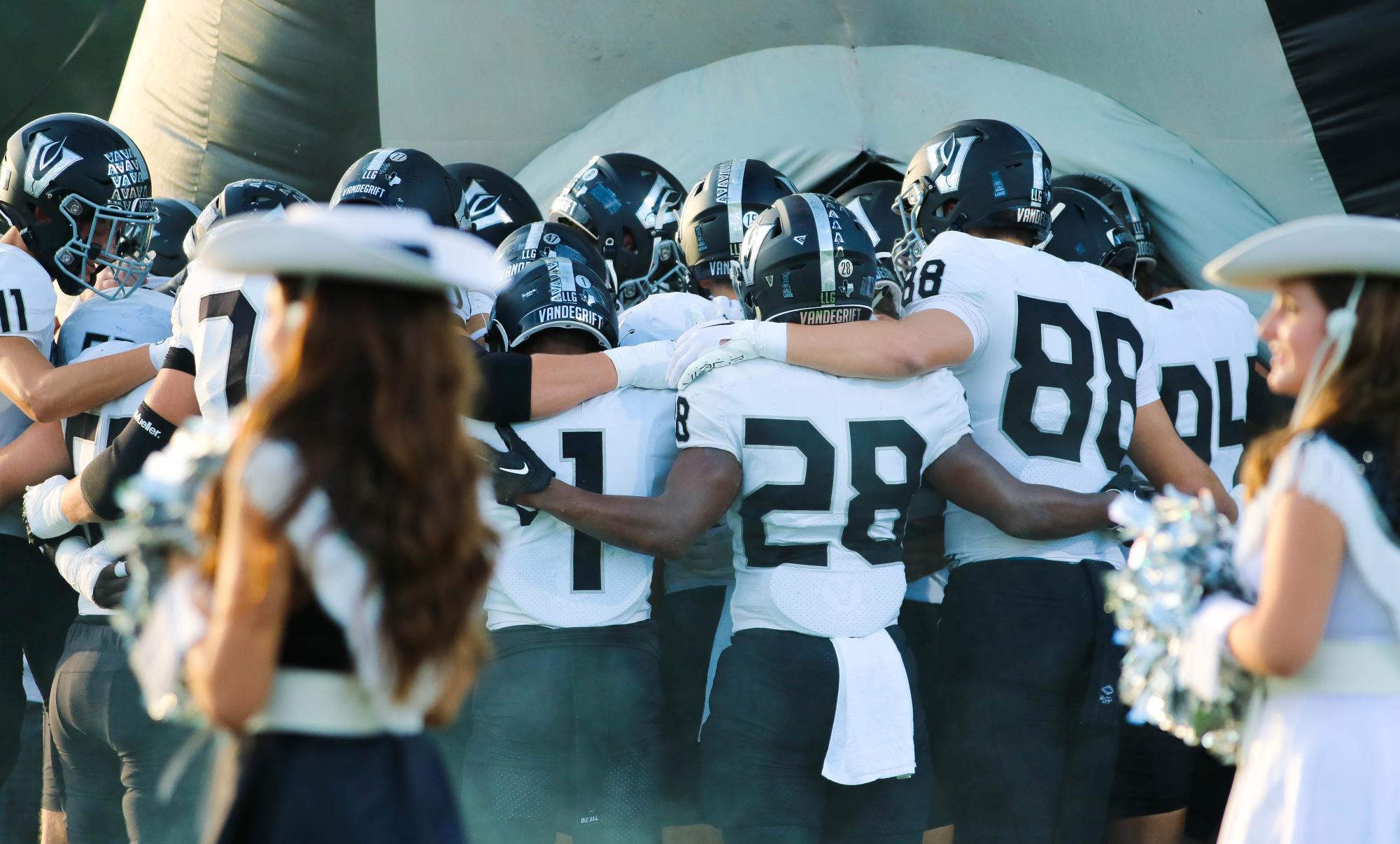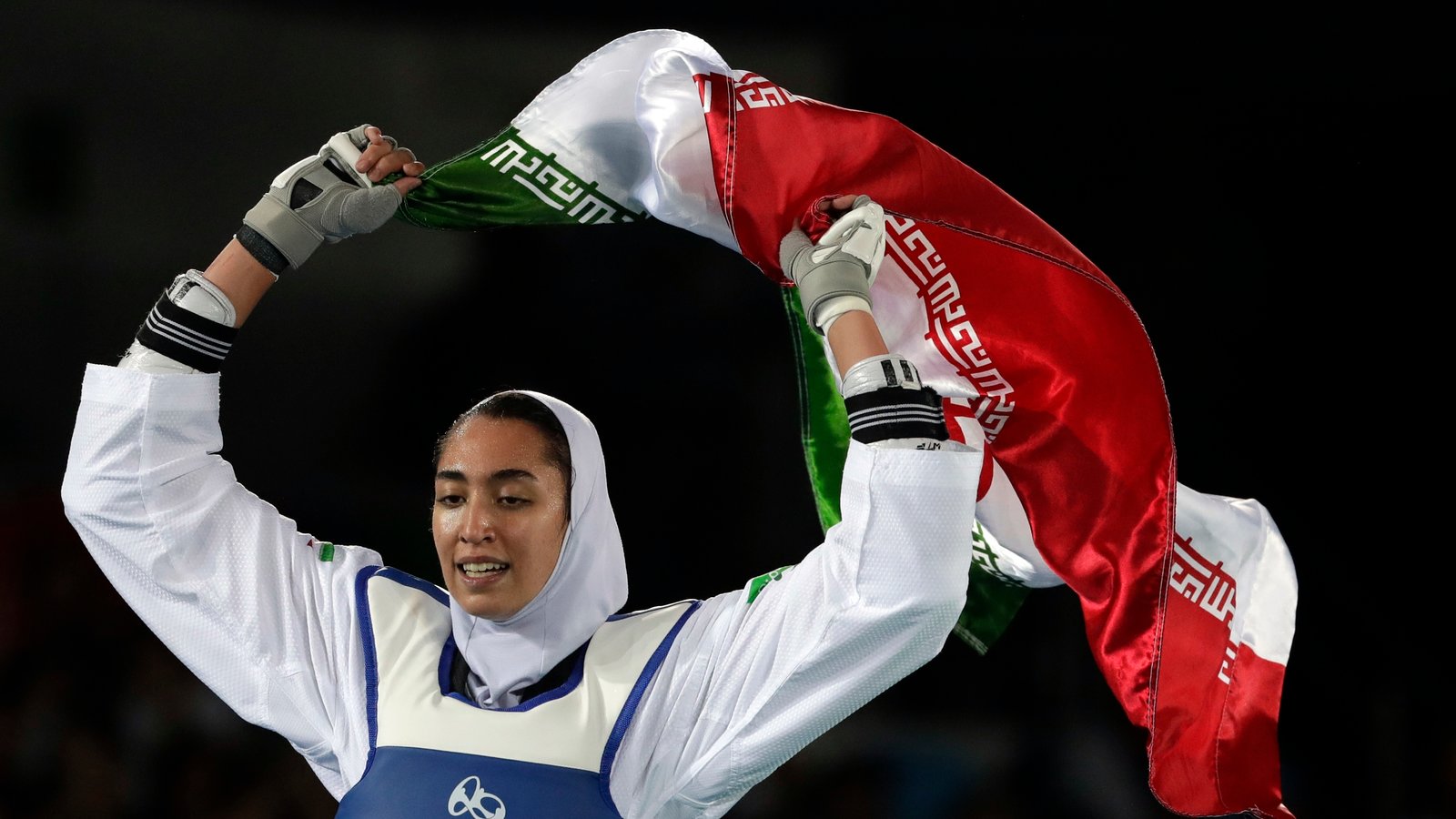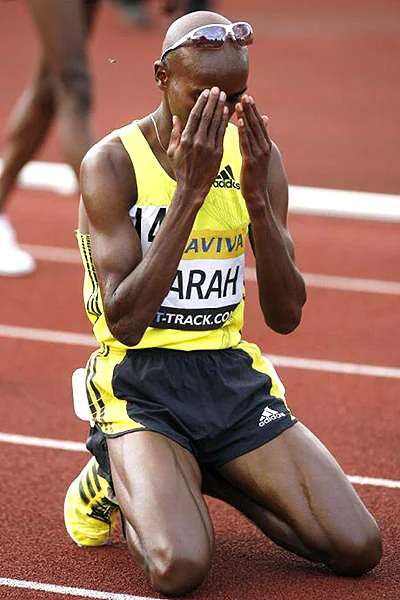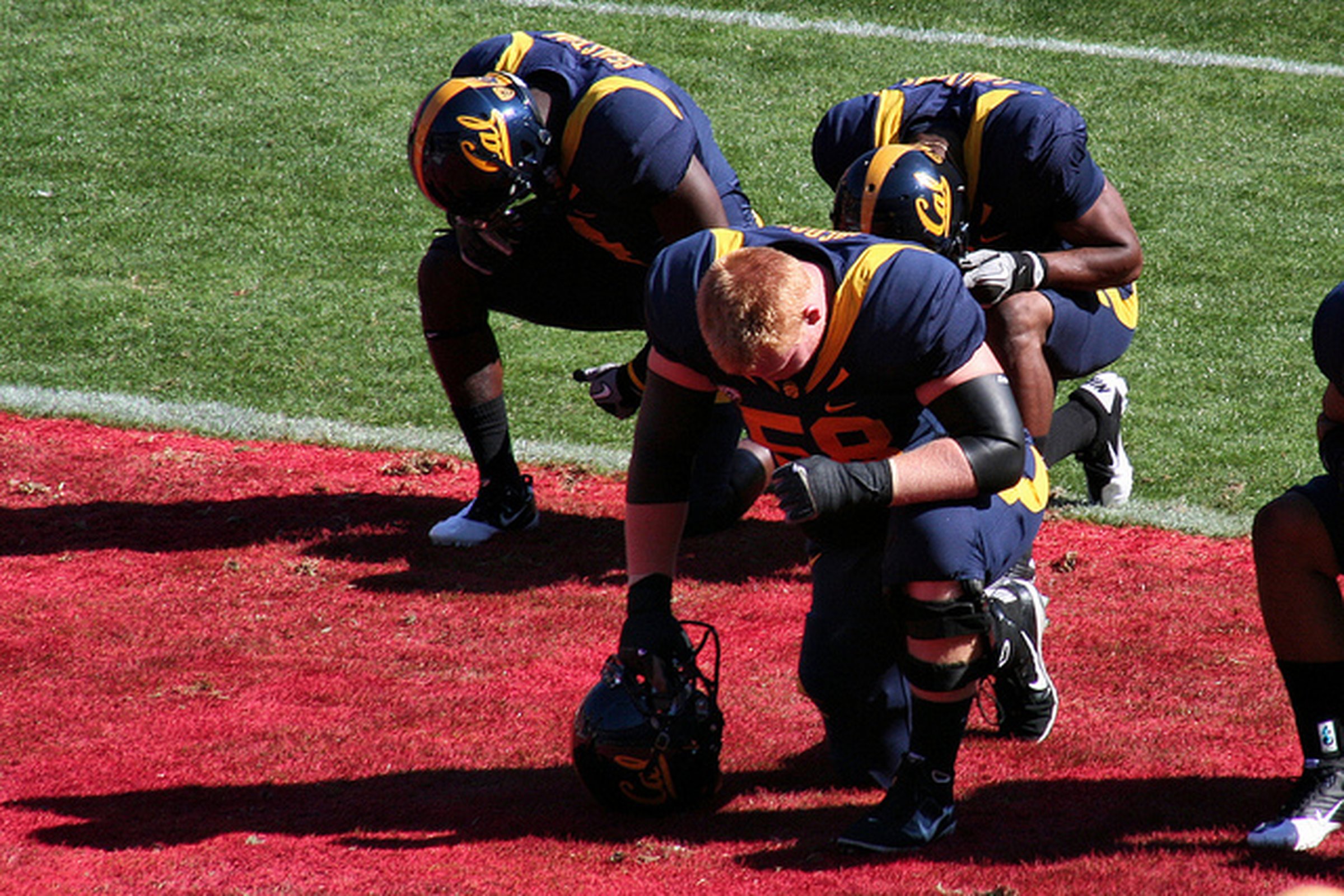Religious Rituals In Sports - Exploring The Spiritual Connection On The Playing Field
Dive into the vibrant world of sports, where religious diversity thrives, fostering unity and understanding among athletes. Explore real-life examples from basketball, football, baseball, and cricket, highlighting the accommodation of religious practices. Discover how sports organizations and players embrace inclusivity, allowing athletes to balance faith and competition seamlessly. Uncover the harmonious coexistence of diverse beliefs in the sporting arena.
Author:Gabriel MartinezNov 07, 202314K Shares260.5K Views

Sports, a universal language that transcends boundaries, has the remarkable ability to bring people together irrespective of their cultural or religious backgrounds. Within the realm of sports, there exists a fascinating intersection with religion: the presence of religious rituals in sports. These rituals, diverse and deeply rooted in faith, add a layer of spirituality to the competitive arena, offering athletes a unique way to express their beliefs and connect with something greater than themselves.
Understanding The Significance - Empowering Athletes Through Spiritual Connection
Religious rituals in sports are far more than mere routines; they represent a profound manifestation of an athlete's spiritual beliefs, deeply rooted in faith and tradition. These rituals, diverse and deeply personal, take various forms, each carrying its unique significance. From the heartfelt pre-game prayers to the post-match acts of gratitude, these rituals are not just a display of religious devotion; they are a source of immense strength and focus, guiding athletes through the challenging terrain of the competitive arena.
Pre-Game Prayers - Finding Solace And Strength
Before the first whistle blows and the crowd roars, athletes often engage in pre-game prayers, seeking solace in their faith. These moments of quiet introspection serve as a sanctuary amidst the chaotic anticipation of the game. Athletes, regardless of their religion, bow their heads, close their eyes, or make symbolic gestures, connecting with their spiritual beliefs. In these moments, they draw strength from a higher power, finding the courage and determination needed to face the challenges ahead.
Post-Match Acts Of Gratitude - Acknowledging The Divine
Victory on the field is often celebrated with post-match acts of gratitude. Athletes, in the euphoria of triumph, express their thankfulness to the divine forces they believe in. Whether it's a heartfelt gesture towards the sky, a prostration, or a simple moment of silent acknowledgment, these acts symbolize more than just gratitude. They represent humility, reminding athletes of their place in the grand scheme of things, instilling a sense of gratitude for the abilities they possess and the opportunity to compete.
A Source Of Strength And Focus - Channeling Energy Amidst Pressure
The life of a professional athlete is riddled with immense pressure, from the expectations of fans to the internal drive for excellence. In this high-stakes environment, religious rituals serve as a source of unwavering strength and focus. The act of engaging in a familiar ritual becomes a ritualistic form of meditation, allowing athletes to channel their energy positively. By grounding themselves in their faith, athletes find a sense of calm amidst the storm, enabling them to perform at their best, even in the most challenging circumstances.
Promoting Mental Resilience - Beyond Physical Prowess
Sports are as much a mental battle as they are a physical one. Religious rituals play a pivotal role in promoting mental resilience. Athletes, through their rituals, cultivate a sense of inner peace and confidence. This mental fortitude often becomes the driving force behind their exceptional performances. By aligning their physical prowess with their spiritual beliefs, athletes navigate the complexities of the game with grace and determination, showcasing not just their skills, but also their unwavering faith.
Embracing Diversity And Inclusivity - The Harmonious Blend Of Faiths In The Sporting World
In a world that sometimes seems divided by differences, the realm of sports stands out as a beacon of unity and inclusivity. Religious rituals in sports, with their diverse tapestry of traditions and beliefs, play a pivotal role in fostering a sense of togetherness and acceptance. The sports arena transcends the boundaries of religion, transforming into a melting pot of faiths where athletes from various backgrounds come together, bound by a shared passion for the game.
Breaking Barriers - The Melting Pot Of Faiths
In the vibrant tapestry of the sporting world, religious rituals dissolve the barriers that often separate communities. Regardless of the faith an athlete follows, the sports field becomes a neutral ground where everyone is equal, and respect for one another's beliefs is paramount. Whether it's a pre-game prayer, a post-match religious gesture, or a moment of silent reflection, these rituals intertwine to create a harmonious atmosphere, where diversity becomes a strength rather than a division.
Inclusive Practices - Nurturing Acceptance And Respect
Sports organizations and teams have recognized the significance of embracing religious diversity, implementing inclusive practices that uphold the values of acceptance and respect. Athletes are encouraged and supported in freely expressing their religious beliefs without fear of discrimination. Dress codesand regulations are adapted to accommodate religious attire, ensuring that athletes can compete while honoring their faith. These inclusive measures not only empower athletes to be true to their beliefs but also send a powerful message of unity to fans and spectators worldwide.
Promoting Unity And Understanding - Bridging Gaps Beyond The Field
The impact of inclusive practices extends far beyond the confines of the sports arena. By fostering an environment where religious diversity is celebrated, sports promote unity and understanding among players, fans, and communities. The respect athletes show for one another's rituals sets an example, encouraging mutual understanding and acceptance among people of different faiths. This spirit of harmony and respect creates a ripple effect, breaking down prejudices and stereotypes, and nurturing a society where differences are celebrated rather than feared.
A Global Message Of Harmony - Inspiring Change
In a world grappling with division, the inclusive environment nurtured by religious rituals in sports sends a powerful message of harmony and acceptance. Athletes, as role models, inspire change not only within the sporting world but also in society at large. Their actions on the field serve as a testament to the potential of unity, showing that when people from diverse backgrounds come together, respecting each other's beliefs, incredible feats can be achieved.
Navigating The Thin Line - Athlete Rituals, Superstition, And Theological Perspectives
In the intricate tapestry of human behavior, rituals have always played a significant role, providing a sense of control and comfort in the face of uncertainty. Athletes, like many individuals, seek solace in routines and rituals, aiming to amplify their perceived means of control in the unpredictable world of sports. However, what begins as a personal coping mechanism can sometimes morph into problematic superstitious practices, blurring the line between belief, habit, and manipulation.
The Desire For Control - A Theological Perspective
From a theological standpoint, the inclination of athletes to seek control through rituals is a natural response to the uncertainties of life. The need to find stability and assurance in the face of challenges is a universal human urge. Athletes, driven by their passion and commitment, often turn to rituals to gain a sense of control over their performance, hoping to influence the outcome in their favor.
The Slippery Slope Of Superstition - Distorting Human Rituals
However, there exists a precarious balance between rituals and superstitions. What begins as a relaxing distraction, such as watching a specific movie before a game, can transform into a rigid, inflexible superstition. Superstitions, while seemingly harmless, can digress to the point where athletes believe they can control the whims of the so-called "sporting gods." These deities, influencing intangibles within the game, symbolize the uncontrollable factors that athletes face. The attempt to manipulate these forces not only distorts the potential of human rituals but also undermines the genuine essence of spirituality and faith.
The Imitation Of Encounter - Superstitions Vs. True Spiritual Connection
Superstitions, in essence, imitate the open encounter with the divine in the world but fall short of the profound depth that genuine spiritual connections offer. While rituals rooted in faith can provide comfort, superstitions often lead to manipulation and false security. Athletes, bound by the consequences of deviating from these superstitious practices, find their freedom curtailed. Fearfully chained to their habits, they lose the spontaneity and genuine passion that make sports a true expression of human potential.
Striving For Balance - Embracing Faith Without Superstition
Recognizing the fine line between rituals and superstitions, athletes can channel their desire for control into genuine faith and belief in their abilities. Embracing spirituality without falling into the trap of manipulative practices allows athletes to find authentic strength and confidence. Faith can serve as a guiding force, providing the necessary resilience to face challenges without the shackles of superstition.
The Impact On Sportsmanship And Performance - Nurturing Excellence Beyond The Field
In the world of sports, where competition can sometimes overshadow the essence of fair play and mutual respect, religious rituals emerge as powerful catalysts, shaping not only an athlete's character but also their performance on the field. The influence of these rituals on sportsmanship is nothing short of profound, creating a ripple effect that goes beyond mere physical prowess.
Cultivating Respect And Humility - The Cornerstones Of Sportsmanship
Athletes who engage in religious rituals often exhibit a heightened sense of respect for their opponents and the game itself. These rituals instill core values such as humility, emphasizing the importance of acknowledging one's strengths while respecting the abilities of others. In the spirit of competition, this humility translates into graceful acceptance of victory and defeat alike, fostering an atmosphere of mutual respect that exemplifies the true spirit of sportsmanship.
Embracing Fairness And Perseverance - Lessons From Rituals
Religious rituals emphasize the principles of fairness and perseverance, integral components of good sportsmanship. Athletes, guided by their faith, understand the significance of fair play, ensuring that the game is won through skill, determination, and teamwork rather than deceit or unfair tactics. These rituals instill a sense of perseverance, teaching athletes to endure challenges with grace and resilience, regardless of the outcome. Such enduring spirit becomes contagious, inspiring teammates and opponents alike to rise above adversities and continue striving for excellence.
Enhancing Mental And Emotional Well-being - The Spiritual Connection
Beyond the physical aspects of the game, the spiritual connection established through these rituals plays a pivotal role in an athlete's mental and emotional well-being. The moments of quiet reflection, prayer, or gratitude create a sanctuary of peace amidst the high-stress environment of competitive sports. This inner calmness not only sharpens focus but also enhances emotional stability, allowing athletes to perform under pressure with composure and confidence.
A Harmonious Balance - Mental Resilience And Spiritual Fulfillment
The impact of religious rituals on an athlete's sportsmanship and performance lies in the delicate balance between mental resilience and spiritual fulfillment. As athletes nurture their faith through these rituals, they find the strength to face challenges with unwavering determination, without succumbing to negativity or despair. This mental fortitude, combined with a deep spiritual connection, creates a harmonious synergy that elevates an athlete's performance, enabling them to achieve remarkable feats while upholding the values of sportsmanship.
Challenges And Resolutions - Navigating The Intersection Of Faith And Sport
The intersection of religious rituals and sports, while profoundly enriching, is not without its challenges. In the dynamic arena of sports, where rules and regulations govern the game, conflicts may arise when deeply-held religious practices clash with established norms. These challenges, though daunting, have spurred sports organizations and authorities to embark on a journey of understanding, adaptability, and inclusivity.
Clashes With Established Rules - Upholding Tradition In A Modern Context
One of the primary challenges faced in the realm of religious rituals in sports arises when these rituals conflict with established rules, be it dress codes, game schedules, or other regulations. Athletes, dedicated to their faith, find themselves torn between honoring their religious beliefs and complying with the norms of the sportthey love. This clash of traditions and modernity calls for a delicate balance, one that respects the sanctity of religious practices while upholding the integrity of the game.
Flexibility And Adaptability - Embracing Inclusivity
In response to these challenges, sports organizations have demonstrated commendable flexibility and adaptability. Instead of stifling religious expression, they have embraced inclusivity as a guiding principle. By acknowledging the diversity of beliefs within the sporting community, authorities have adopted flexible policies that accommodate religious practices. Whether it involves allowing specific religious attire or adjusting game schedules to accommodate religious observances, these measures reflect a commitment to honoring an athlete's faith journey.
Striking A Balance - Tradition And Modernity In Harmony
The key to resolving these challenges lies in striking a harmonious balance between tradition and modernity. Sports organizations have recognized the importance of preserving the rich tapestry of human beliefs while ensuring that the essence of the game remains intact. By fostering an environment where athletes can observe their faith without hindrance, sports authorities have set a precedent for a harmonious coexistence of religious rituals and athletic endeavors.
Enabling Full Participation - Empowering Athletes
Crucially, these resolutions empower athletes to participate fully in their chosen sports without compromising their religious convictions. By providing avenues for religious expression within the framework of the game, sports organizations have not only nurtured inclusivity but also enhanced the overall sports experience. Athletes can now step onto the field with confidence, knowing that their faith is respected, and their performance is not impeded by unnecessary obstacles.
Embracing Religious Diversity In Sports - Real-life Examples
In the diverse world of sports, embracing religious diversity has become fundamental to fostering inclusivity and understanding among athletes. Numerous sports organizations and athletes globally have actively accommodated religious rituals, allowing individuals from different faiths to practice their beliefs while engaging in their chosen sports.
Basketball - FIBA's Inclusivity Strides
In basketball, FIBA's revised regulations now permit players to wear religious headgear during games, a significant stride towards inclusivity within the sport.
Football - Balancing Faith And Matches
In football, prominent players like Mohamed Salahand Mesut Özil adeptly manage their devotion to Ramadan, balancing their religious practices with training and matches. Their teams have adjusted training routines and dietary plans, demonstrating a respectful approach to accommodating religious diversity in sports.
Baseball And Cricket - Accommodating Religious Obligations
Furthermore, baseball and cricket have witnessed instances of religious accommodation. Sikh baseball players were allowed to wear turbans instead of caps, respecting their religious obligations. In cricket, pre-match prayers have become a common practice, showcasing the acknowledgment of diverse religious beliefs within the sport.
A Testament To Unity Amidst Differences
These real-life examples exemplify the continuous efforts made by the sports community to create an inclusive environment for athletes of all faiths. By embracing religious diversity, sports not only enhance athletes' experiences but also stand as a powerful testament to unity amidst differences.
Exploring Religious Diversity Across Countries
For further insights into religious diversity across countries, Fellowship Bible Church Waco has compiled valuable information on the most religious countries in the world. This insightful analysis sheds light on the diverse religious landscapes shaping global cultures. To explore in-depth details, please visit their website: Most Religious Countries in the World.
Religious Rituals In Sports - FAQs
What Are Some Rituals In Sports?
Rituals in sports vary widely across different cultures and sports disciplines. Some common sports rituals include pre-game prayers, team chants, handshakes or high-fives before or after a match, wearing specific clothing or accessories for luck, visualization exercises, and post-game rituals to celebrate victories. Athletes often have personal rituals like wearing lucky socks or listening to specific music before a game to mentally prepare themselves.
What Sport Started As A Religious Ritual?
Yoga is a sport that originated as a religious ritual. It has ancient roots in Indian philosophy and has been practiced for thousands of years as a spiritual and meditative discipline. Over time, yoga evolved into a physical and mental exercise form that is now practiced globally for its health benefits and stress-relieving properties.
How Does Religion Play A Role In Sports?
Religion plays a significant role in sports in various ways:
- Inspirational Role Models:Religious athletes often serve as inspirational role models, showcasing how faith can drive discipline, resilience, and ethical behavior in sports and life.
- Inclusivity and Accommodation:Many sports organizations accommodate religious practices, such as allowing athletes to observe religious rituals, wear religious attire, or modify schedules to respect religious observances, promoting inclusivity.
- Cultural Significance:Sports events and rituals often intertwine with religious celebrations and festivals, reflecting the cultural and religious identity of communities worldwide.
- Moral and Ethical Values:Religious teachings often emphasize values like fairness, humility, and respect, which translate into good sportsmanship and ethical conduct in the sporting arena.
- Community and Fellowship:Religious institutions often organize sports events, fostering a sense of community and fellowship among believers, encouraging physical fitness and camaraderie.
Conclusion
In the realm of sports, religious rituals serve as a unifying force, bridging the gap between diverse faiths and cultures. By embracing these rituals, athletes honor their beliefs, inspire others, and create a harmonious environment where spiritual expression is celebrated. As the world continues to celebrate the intertwining of religion and sports, these rituals will undoubtedly remain a powerful testament to the enduring connection between faith and athleticism.
Jump to
Understanding The Significance - Empowering Athletes Through Spiritual Connection
Embracing Diversity And Inclusivity - The Harmonious Blend Of Faiths In The Sporting World
Navigating The Thin Line - Athlete Rituals, Superstition, And Theological Perspectives
The Impact On Sportsmanship And Performance - Nurturing Excellence Beyond The Field
Challenges And Resolutions - Navigating The Intersection Of Faith And Sport
Religious Rituals In Sports - FAQs
Conclusion

Gabriel Martinez
Author
Gabriel Martinez is a respected author at Tennessee Independent, renowned for his expertise in covering News and Sports topics. With a comprehensive understanding of current events and a knack for delivering accurate and engaging content, Gabriel provides readers with insightful analysis and compelling narratives. His dedication to factual accuracy and commitment to delivering authoritative content make him a trusted source for news and sports enthusiasts on Tennessee Independent.
Latest Articles
Popular Articles



